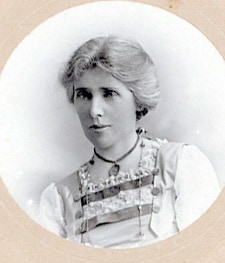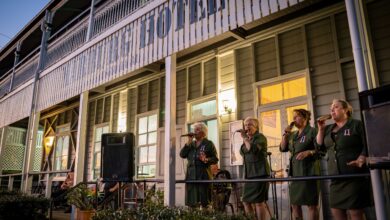
Images Courtesy: Picture Ipswich
Many may not associate cups of tea and a plate of biscuits with grit and determination.
But they would be wrong.
These ladies may have spent half the night baking and preparing their baskets they are now offering to the hundreds of men aboard the train, dressed for war.
The Ipswich Train Tea Society was established by the women of Ipswich in the early 1900s and enabled those at home contribute to the war effort.
At all hours of the night or day, these dedicated residents would meet trains travelling through Ipswich to provide tea and refreshments to the soldiers heading off to the western front as well as returned servicemen and women.
At the time the rail route from Sydney to Brisbane passed through Warwick, Toowoomba and Ipswich.
According to a The Queensland Times article from November 1922, it was estimated that between 30,000 and 40,000 soldiers passed through Ipswich.
RSL museum curator Mick Corkery said it was Mrs Cameron who was the driving force behind establishing the Soldiers Memorial Hall (the current Ipswich RSL sub branch on Nicholas Street).
Walking past this beautiful building today, many might associate it with imagery of men fighting for their country and giving their lives. Most probably don’t associate it with a group of women and their determination to pay respects to those who served.
“In about 1916, Mrs Cameron got her troops together and started raising funds to build this building. She and the school children would have fetes and picnics to raise the money, then the Ipswich City Council threw in the rest,” Mr Corkery said.
“On the day they opened, they were short a few thousand pounds, so they grabbed a flag and walked around the streets here and managed to raise the rest of the money to make the final payment.”
This excerpt from Ipswich In the 20th Century by Robyn Buchanan reads:
Bob Sneyd was a small child when the memorial hall was built and the foundation stone ceremony greatly affected him. ‘I was present when the foundation stone for the memorial Hall was laid by General Birdwood. Of course, I lived just up the road from there. They carried around a flag collecting donations for the hall. I was one of five fatherless children and I only had a few pence. I know I had about 2 shillings and 10 pence at home among my treasures. I ran home and I got this money and I threw it into the flag’.
In September 1919, there were 24 members of the society, however, numbers fluctuated and at one stage decreased to six as the ladies married.
One of their contributions after the war was to furnish the hall and commission and install a magnificent stained glass window. The memorial window was unveiled on November 30, 1922 by Governor Sir Walter Nathan and at the time was claimed to be the “finest example of stained glass produced in Australasia”.
Ipswich RSL sub-branch operates a museum at Memorial Hall, open on the last Sunday of the month (except December) from 8.30am to noon. Group appointments at other times can be catered for.
Admission is free. Memorial Hall is at 63 Nicholas Street, Ipswich.
For more information email [email protected]

An article in The Queensland Times on June 1920 talks about the Train Tea Society’s enthusiasm and earnest preparation.
TRAIN TEA GIRLS’ ENTERTAINMENT
If enthusiasm and earnest preparation go for anything, the entertainment arranged to be held in the Town Hall tonight by the Train Tea Society, should be an unqualified success.
But through organisation is not its only recommendation for an excellent programme has been arranged with many novel and attractive items and lovers of bright music, song and scenery will find their tastes amply catered for.
The second half of the programme will include the staging of an ambitious presentation to “Cinderella”. In addition to all the promised attractions, the fact that the entertainment is in aid of Mr J. G. Farquhar, a returned soldier, should encourage a large attendance.

